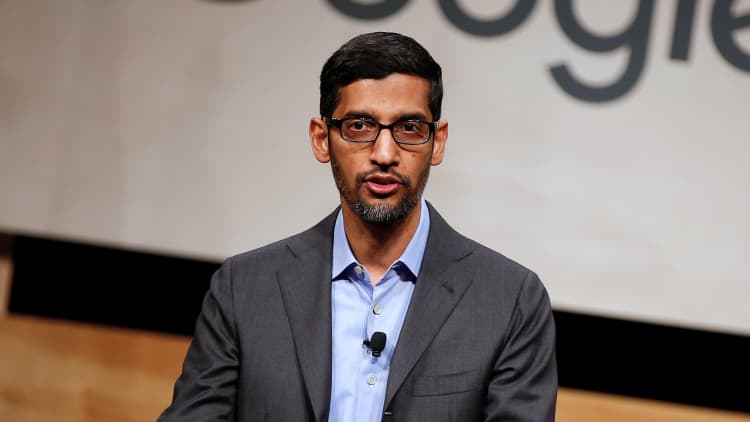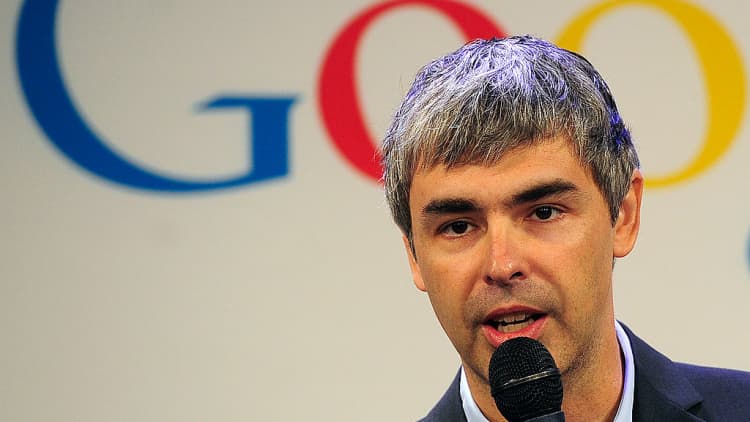
Congrats to Sundar Pichai, who just got promoted to the worst job in Silicon Valley.
On Tuesday, Google's parent company Alphabet dropped the bombshell that co-founders Larry Page and Sergey Brin are stepping down as CEO and president, respectively, and that the 47-year-old Pichai will become CEO of all of Alphabet.
The move comes over four years after Page orchestrated the most genius retirement plan in the history of business. Growing bored of Google's day to day chores, he split the company into several "Other Bets," or separate companies exploring science projects like self-driving cars and smart cities, while leaving the main internet search business to his trusted deputy Pichai. That freed Page to explore his passion projects.
Now, after spending the last several years effectively AWOL from the public and much of Alphabet, Page and Brin, both 46, are out just in time for the company to muddle through the biggest challenges in its history.
And poor Pichai has been tasked with navigating Alphabet through all of it, while Page and Brin get to shield themselves from all of the scrutiny and challenges.
But even as the new leader of Alphabet, Pichai is stuck between a rock and a hard place. And Page and Brin will still loom over all of it.
The rock: Pichai is now in charge of a focus-free smattering of money-losing Other Bets that are noodling around with everything from curing death to beaming the internet to the Earth from high-altitude balloons. But none of those Other Bets has turned into the major businesses Alphabet hoped for.
Google is still Alphabet's cash cow, generating effectively all of its revenue thanks to its lucrative digital ads business. There are no signs that the "next Google" will grow out of an Other Bet any time soon. (In fact, some Other Bets like the smart home company Nest and cybersecurity company Chronicle have been folded back into Google.)
Pichai's task will now be to decide what to do with Alphabet's duds. Do they spin back into Google? Do they pack it all up and call it quits? Does Alphabet invest less in them?
But that brings us to ...
The hard place: Page and Brin may have stepped down from their day jobs, but they're still lurking. They have controlling stakes in the company and said they'd remain "active" board members. If Pichai decides it's time to cut back on some Other Bets, he could still be outvoted by Page and Brin. Good luck to Pichai if he ever wants to persuade them to put their favorite science projects on ice and focus on ways to keep Google growing instead.
But wait, there's more.
Beyond the power dynamic between Page, Brin and Pichai, Google faces crisis after crisis, ranging from employee protests to antitrust investigations that threaten to break up the company.
Google's employees are openly revolting over the company's handling of sexual harassment and controversial executives hires like Miles Taylor, the former Department of Homeland Security chief of staff who defended the Trump administration's Muslim travel ban. Last month, 200 employees in San Francisco protested Google's various contentious decisions. Shortly after, four of the protesters were fired. Google has denied that the employees were fired for organizing. Now those former employees, dubbed the "Thanksgiving Four" plan to file charges against Google with the National Labor Relations Board.
Meanwhile, Google is investigating its own executives over inappropriate relationships they may have had with subordinates, CNBC first reported last month. That includes Chief Legal Officer David Drummond, who recently married an employee in Google's legal department and faces a string of damaging allegations from another former employee with whom he had an extramarital affair.
Next, there's YouTube, which has faced controversy after controversy in recent years, ranging from pedophiles lurking in video comments where underage children appear, to the spread of conspiracy theories about victims of the school shooting in Parkland, Florida, last year. (We'd be here all day if I listed every recent YouTube crisis and failure.)
And then there are the dollars and cents. Growth in Google's core digital advertising business is slowing, and the pressure is mounting for the company to find new areas of expansion. While its cloud and hardware businesses are showing some promise, they still make up a tiny fraction of Google's overall revenue. At its core, Google is still an advertising company.
But that's just the internal stuff. Outside the company, nearly every state attorney general in the country is looking into antitrust violations related to Google's ad business. CNBC reported last month that the probes may expand into Google's search business as well. The FTC and Department of Justice are also said to be looking at Google's potential antitrust violations.
With so much scrutiny from regulators and attorneys general, there will almost certainly be some sort of action taken, and Pichai is now the one who has to steer the ship as various government agencies seek to punish his company. Page and Brin picked the perfect time to step down and protect themselves.
Now for the good news
It's nearly impossible to say anything bad about Pichai. He's quieter and more reserved than his predecessors. He's a real geek and engineer, the rare nice guy running a nearly trillion-dollar behemoth. Pichai is more likely to bring focus and attention to the issues facing Alphabet while trimming out the excesses. Alphabet can no longer maintain its freewheeling culture at its size, and Pichai has the gravitas within the organization to change that.
Then there's accountability. As Alphabet and the rest of Big Tech navigate through so-called tech lash, the company finally has a leader who hasn't gone AWOL, hidden from the public and investors and making who knows what kind of decisions behind the scenes.
Practically, not too much is going to change. Pichai has been effectively running the core of Alphabet for more than four years. Page and Brin had ultimate control then, and moving forward their influence will only be modestly reduced thanks to their board seats and majority stakes in the company. They're still Pichai's bosses.
But on paper, it's all on Pichai now. And it's tough to envy someone who just got the worst gig in tech.



